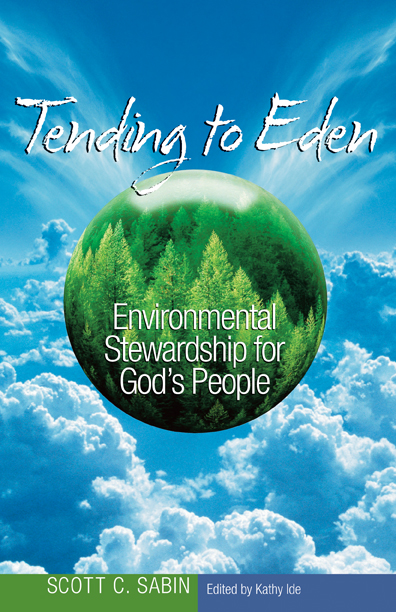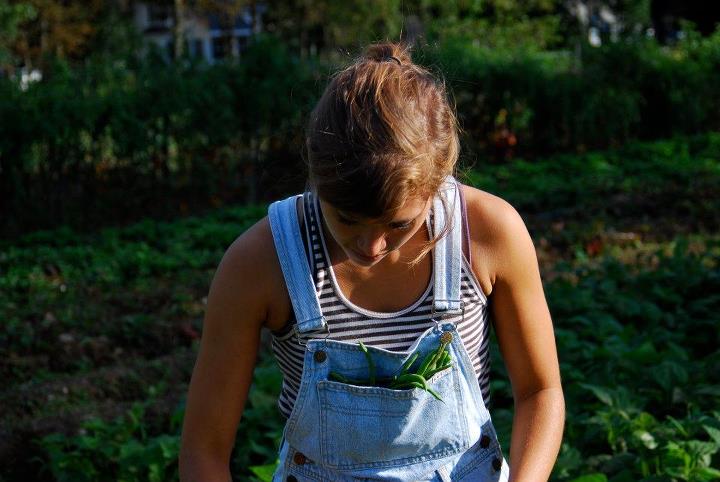Caretakers of Creation, after she spent her past semester at the Creation Care Study Program in Belize, Central America. By Nina Voli
 View and Print as PDF.
View and Print as PDF.
 Often when I throw out the phrase “creation care” in the presence of those who are unfamiliar with it, they ask me to provide a definition. I frequently fumble over words, form complicated sentences, and ultimately end up speaking an entirely different language. This is because there exist, within those two small words, far-reaching implications that are at once theological and scientific, spiritual and practical, economic and ecological. Scott C. Sabin, in his book Tending to Eden, does an excellent job of pulling together all the various factors that intersect within this area that many people of faith are beginning to call creation care. Creation care is best defined as a conversation, and as such it is both the merging and departure point for a multitude of other conversations, equally theological, environmental, economic, and social. With this as a framework, people of faith are attempting to respond anew to the age-old question: What does it mean to be faithful human beings in a complicated world?
Often when I throw out the phrase “creation care” in the presence of those who are unfamiliar with it, they ask me to provide a definition. I frequently fumble over words, form complicated sentences, and ultimately end up speaking an entirely different language. This is because there exist, within those two small words, far-reaching implications that are at once theological and scientific, spiritual and practical, economic and ecological. Scott C. Sabin, in his book Tending to Eden, does an excellent job of pulling together all the various factors that intersect within this area that many people of faith are beginning to call creation care. Creation care is best defined as a conversation, and as such it is both the merging and departure point for a multitude of other conversations, equally theological, environmental, economic, and social. With this as a framework, people of faith are attempting to respond anew to the age-old question: What does it mean to be faithful human beings in a complicated world?
Through my own engagement in this conversation, I have found myself both burdened with a Christianity that does not see how very big and far-reaching the gospel is, and lifted up by my desire to help the church wake up to this reality. For the longest time the church, particularly the American church, has been settling for and propagating a gospel that maintains the status quo, rather than propels us into the kind of radical action that we are called to as members of God’s Kingdom. We have tended to view the gospel as a token for getting into heaven, rather than an invitation to the purposeful, embodied work of representing the kingdom of heaven here on earth. Our pronounced emphasis on personal spirituality and sin-avoidance has led to a truncated view of the gospel.
The fact that the connection between environmental stewardship, social justice, and faith in Christ is so difficult a leap for people within the church to make is evidence of this limitation. In the same way that we have compartmentalized our lives into the sacred (the “religious”) and the secular (the “sinful”), we have compartmentalized the gospel. We have extracted the gospel for the individual from the gospel for the world, and effectively elevated the former over the latter. Yet in order for us to be a part of God’s redemptive work on earth, our first step is to recognize the sheer scope of the gospel—that not only are we personally reconciled to God in Christ, but that God is in the business of “reconciling the world to himself through Christ.”[1] In this way we can arrive at a gospel that is good news for all of creation and not just for the private human sector.
Along with Sabin, we must affirm that “the biblical account is not just the story of God’s love for his people and the redemption of humankind through Christ. It is that, but it is also the story of God’s love for everything he has made.”[2] Moreover, the biblical account does not render us mere recipients of the good news, but call us “God’s fellow workers” (2 Cor. 6:1), or God’s partners in the ongoing work of reconciliation between God, self, earth, and neighbor. Another word for this reconciliation is Shalom. God is waiting for a people to rise up who are willing and eager to participate in this work of Shalom—to help bring peace and wholeness to God’s creation.
It seems as though a new kind of evangelism needs to take place in order for this to happen. It begins with embodying a way of life that acknowledges everything in creation as part of the dynamic story of restoration. If people are to come face to face with the gospel for the world, it is going to be through witnessing that gospel being lived out by the church. As Sabin reminds us, evangelizing has never been about making converts, but it has always been about making disciples; and disciples are people who follow a particular way of life.[3]
___________________________________________
As inhabitants of a deeply fractured world, we each face the temptation to resort to either denial or despair. Yet the beauty of the Gospel in its fullness is that we do have another choice. We are capable of moving towards what Sabin calls “informed hope”.
___________________________________________
If we as people of faith are to model this gospel with our lives, we must frame our witness as “relationship.” The truth is that we cannot fully love God and love our neighbor as ourselves until we recognize that our relationship with Creation is inextricably connected to both of the other two.
Few would deny that a concern for the poor is integral to the Christian life. While we may not always behave in a way that lines up with this truth, we know that there must be some reason Jesus’ life and ministry touched directly on issues of poverty. However, that concern takes on the possibilities of restoration when poverty is framed in terms of relationships. For, as Sabin points out, “the root cause of poverty is broken relationships.”[4] How could we deny this, when the issues of hunger, disease, and deprivation have so clearly resulted from the failure of the human community to adequately care for, provide for, and share with one another?
Yet in thinking in terms of relationships, we can take our analysis one step further to recognize that these same issues are also the result of our broken relationship with the earth. People often assume that one must choose between caring for the environment and caring for people, but in reality these two goals are intimately connected. How we choose to sustain our lives on the earth through our means of resource extraction, production, and consumption has direct effects on human communities and their livelihoods, and particularly on marginalized and rural communities. Consequently, our efforts towards environmental and social justice can, and should, work in tandem. For example, our decisions in response to climate change are directly linked to our response to the poor who will be impacted disproportionately by its effects.[5]
Creation care, which encompasses a response to poverty as well as to the issues of economic, social, and environmental justice that compound it, requires what Sabin calls an “upstream mindset.”[6] In other words, instead of looking only at the symptoms of poverty, and addressing those issues through relief and aid, we should be proactive in addressing the root causes. These causes are always varied and complicated, which is why people of faith, particularly those involved in development work, need to take on a more holistic approach to empowering the poor and oppressed. After all, development, in all senses of the word, is never in reference to a strictly linear progression. In my own experience, I have found it helpful to think of development as an unfolding. As it is with all of creation, our role with our human neighbors, near and far, is to desire and facilitate the multidimensional becoming of a community into what it was created to be. This process involves empowerment, and “empowerment takes time”, says Sabin.[7] It is a slow process, yet so is all of the work involved in bringing the gift of Shalom to earth.
When we survey the current issues facing creation and the global community, we can often become overwhelmed. Often I find myself caught in between two extremes: to live in blissful ignorance of all the brokenness that is present in the world, or to come into full contact with it, and become entirely paralyzed with grief. Scott Sabin identifies these two responses as “denial” and “despair”. As inhabitants of a deeply fractured world, we each face the temptation to resort to one or the other of these two postures, often feeling like we have no other choice. Yet the beauty of the Gospel in its fullness is that we do have another choice. We are capable of moving towards what Sabin calls “informed hope”. We are able to look at the world, with all of its shattered relationships, spread out and scattered in pieces, and to know that somehow God plans to pull them all back together again, in an unimaginably new way.
“There is no greater opportunity in the world than to serve God, tend to creation, and take care of our neighbors,” said one of our professors at the Creation Care Study Program in Belize, Central America. This indeed is true, and it is also worth getting excited about! Along with Sabin, and the multitude of others who have caught on to this vision of creation care, I long to see people of faith join in the excitement, and to go forth to carry out the messy, glorious, gradual work of bringing God’s Kingdom to earth. The Kingdom is already making its way here, regardless of whether or not we acknowledge it; the decision then comes to us as individuals, communities, and people of faith, as to whether we will stand by and watch, or join in its movement through exercising care for all of God’s creation.
Learn more about Scott Sabin’s book, Tending to Eden: Environmental Stewardship for God’s People
Read more articles like this one in the Nov 2012–Jan 2013 issue, “Hope for Eco-Activists: Discovering an Environmental Faith“
Notes
[1] 2 Corinthians 5:19, NIV
[2] Sabin, Scott. 2010. Tending to Eden: Environmental Stewardship for God’s People. Judson Press, Valley Forge, PA. p 98.
[3] Ibid., p 65
[4] Ibid., p 66
[5] Ibid., p 84
[6] Ibid., p 108
[7] Ibid., p 29







Unbound Social